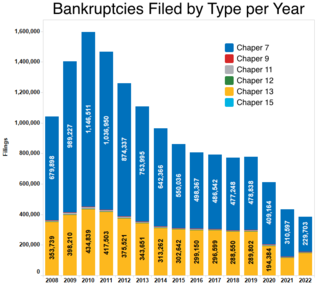Bankruptcy is a legal process through which people or other entities who cannot repay debts to creditors may seek relief from some or all of their debts. In most jurisdictions, bankruptcy is imposed by a court order, often initiated by the debtor.
Personal bankruptcy law allows, in certain jurisdictions, an individual to be declared bankrupt. Virtually every country with a modern legal system features some form of debt relief for individuals. Personal bankruptcy is distinguished from corporate bankruptcy.

In the United States, bankruptcy is largely governed by federal law, commonly referred to as the "Bankruptcy Code" ("Code"). The United States Constitution authorizes Congress to enact "uniform Laws on the subject of Bankruptcies throughout the United States". Congress has exercised this authority several times since 1801, including through adoption of the Bankruptcy Reform Act of 1978, as amended, codified in Title 11 of the United States Code and the Bankruptcy Abuse Prevention and Consumer Protection Act of 2005 (BAPCPA).
In accounting, insolvency is the state of being unable to pay the debts, by a person or company (debtor), at maturity; those in a state of insolvency are said to be insolvent. There are two forms: cash-flow insolvency and balance-sheet insolvency.

St. John's University School of Law is a Roman Catholic law school in Jamaica, Queens, New York, United States, affiliated with St. John's University.
As a legal concept, administration is a procedure under the insolvency laws of a number of common law jurisdictions, similar to bankruptcy in the United States. It functions as a rescue mechanism for insolvent entities and allows them to carry on running their business. The process – in the United Kingdom colloquially called being "under administration" – is an alternative to liquidation or may be a precursor to it. Administration is commenced by an administration order.

The Ministry of Corporate Affairs is an Indian government ministry primarily concerned with administration of the Companies Act 2013, the Companies Act 1956, the Limited Liability Partnership Act, 2008, and the Insolvency and Bankruptcy Code, 2016.
Chapter 9, Title 11, United States Code is a chapter of the United States Bankruptcy Code, available exclusively to municipalities and assisting them in the restructuring of their debt. On July 18, 2013, Detroit, Michigan became the largest city in the history of the United States to file for Chapter 9 bankruptcy protection. Jefferson County, Alabama, in 2011, and Orange County, California, in 1994, are also notable examples. The term 'municipality' denotes "a political subdivision or public agency or instrumentality of a State," but does not include a state itself. States are therefore unable to file for bankruptcy even though they have defaulted in their obligations.
Duane Morris LLP is a law firm headquartered in Philadelphia, Pennsylvania. The firm was founded in 1904 as Duane, Morris, Heckscher, & Roberts, and has offices in the United States, London, Singapore, Vietnam, Oman, Myanmar, Shanghai, and Taiwan. In addition to legal services, Duane Morris has independent affiliates in other disciplines.
Robert E. Gerber is a former United States Bankruptcy Court judge from the Southern District of New York, who presided over the General Motors bankruptcy of June 2009. Gerber previously presided over the bankruptcy of Adelphia Communications Corporation and Ames Department Stores. Gerber served in that office from 2000 to 2016.

Peter S. Kaufman is an American investment banker and private equity investor. He is the President and Head of Restructuring and Distressed M&A at Gordian Group LLC, an investment banking firm. He is also a Managing Partner of Bacchus Capital Management, a winery investment concern.
Bankruptcy in Irish Law is a legal process, supervised by the High Court whereby the assets of a personal debtor are realised and distributed amongst his or her creditors in cases where the debtor is unable or unwilling to pay his debts.

Commercial insolvency in Canada has options and procedures that are distinct from those available in consumer insolvency proceedings. It is governed by the following statutes:
The Companies' Creditors Arrangement Act is a statute of the Parliament of Canada that allows insolvent corporations owing their creditors in excess of $5 million to restructure their businesses and financial affairs.
John Anthony Edwards Pottow is the John Philip Dawson Collegiate Professor of Law at the University of Michigan Law School, specializing in international commercial law, bankruptcy and consumer finance. In addition to scholarship, Pottow is known for pro bono work and has argued pro bono cases before the United States Supreme Court and several United States Courts of Appeals, winning an award for pro bono service. His public service in international trade law includes service on the United States Delegation to the United Nations Commission on International Trade Law (UNCITRAL) and the State Department's Advisory Committee on Private International Law.
Insolvency law of Russia mainly includes Federal Law No. 127-FZ "On Insolvency (Bankruptcy)" and Federal Law No. 40-FZ "On Insolvency (Bankruptcy) of Credit Institutions".

Bhupender Yadav is an Indian politician who is serving as 20th Minister of Environment, Forest and Climate Change since 2024. He is also a Member of Parliament, Lok Sabha from Alwar. He is a Member of Parliament in the Rajya Sabha, representing the state of Rajasthan, a position he has held since 2012. He was reelected in April 2018.
The National Company Law Tribunal (NCLT) is a quasi-judicial body in India that adjudicates issues relating to Indian companies. The tribunal, established under the Companies Act 2013, was constituted on 1 June 2016 by the government of India and is based on the recommendation of the V. Balakrishna Eradi committee on law relating to the insolvency and the winding up of companies.
Cross-border insolvency regulates the treatment of financially distressed debtors where such debtors have assets or creditors in more than one country. Typically, cross-border insolvency is more concerned with the insolvency of companies that operate in more than one country rather than bankruptcy of individuals. Like traditional conflict of laws rules, cross-border insolvency focuses upon three areas: choice of law rules, jurisdiction rules and enforcement of judgment rules. However, in relation to insolvency, the principal focus tends to be the recognition of foreign insolvency officials and their powers.
The Insolvency and Bankruptcy Code, 2016 (IBC) is an Indian law which creates a consolidated framework that governs insolvency and bankruptcy proceedings for companies, partnership firms, and individuals.





